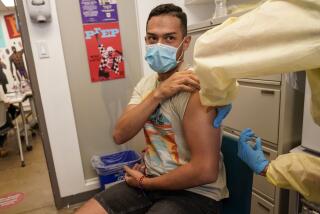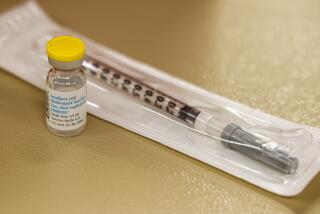Dangers Aside, Smallpox Vaccinations to Expand
- Share via
WASHINGTON — Federal officials said Thursday they were preparing to expand the government’s smallpox vaccination program, even as a second vaccinated worker died and an expert panel encouraged health departments to ensure they are prepared to respond to a bioterrorist attack rather than simply vaccinate.
The death Wednesday of a Florida nurse’s aide, who suffered a heart attack 17 days after being vaccinated, came just three days after a vaccinated Maryland nurse had a heart attack and died.
Five other civilians who developed heart problems after being vaccinated, as well as 10 vaccinated military personnel who suffered heart inflammation, have fully recovered.
The vaccine probably caused the cases of heart inflammation, or myopericarditis, said physicians at the Pentagon and the Centers for Disease Control and Prevention. But they remain unconvinced that the vaccine is linked to three post-vaccination heart attacks, including the two fatal ones.
The CDC and outside experts are scheduled to begin a formal investigation of the cardiac cases today. Until their inquiry is completed, people who already have heart problems will not be vaccinated.
Yet federal officials say they have no plans to extend the temporary vaccination restrictions to all volunteers who have risk factors for heart disease -- including high blood pressure and a history of smoking.
“If you looked at all known risk factors ... it would be very difficult to enhance our preparedness,” says Dr. Walter Orenstein, director of the CDC’s national immunization program. “We are not recommending a pause because of concern for the need to get prepared, especially with events going on around the world.”
Orenstein also dismissed Thursday’s recommendation by an Institute of Medicine committee that the CDC and state and local health departments stop, evaluate the program’s progress and figure out exactly how to prepare to respond to a smallpox attack before continuing to vaccinate greater numbers and additional groups of people.
“The focus should be not on fixed numbers” but on the ability to isolate and treat smallpox victims and prevent the spread of the deadly virus, said Dr. Brian Strom. He is chairman of the institute’s committee on the smallpox program, which was created at CDC’s request.
“It is important to define the goal of the program as preparedness
But the CDC plans to tell states within two or three weeks that they can go ahead with the program’s second phase. This would allow them to begin vaccinating police, fire and emergency personnel in addition to front-line health workers.
The program, which began Jan. 24, was intended to vaccinate up to 450,000 front-line health-care workers within a month or so. Then, in a distinct second phase, as many as 10 million police, fire and emergency medical personnel were to be inoculated.
By last Friday, just 25,645 people, almost all of them public health or hospital workers, had been vaccinated.
Concerns about the vaccine’s risks, uncertainty about the threat level and the lack of guaranteed compensation for people injured by the vaccination have dampened participation.
Some labor unions, including the California Nurses Assn., have actively discouraged their members from volunteering until several issues, primarily compensation questions, were resolved.
This week’s news that two vaccinated health workers have died and several others have experienced heart problems has only served to heighten such concerns.
The Service Employees International Union, which has 1.5 million members, sent a letter to President Bush on Wednesday night telling him that until he signs legislation guaranteeing compensation, more aggressive screening and other vaccination safeguards, “the pre-event vaccination program should be suspended entirely.”
Bush administration officials presented their proposal for a compensation fund this month, hoping that it would jump-start the stalled program. But the legislation, which they predicted would move quickly through Congress, has instead stalled in the Senate and House.
Late Thursday, Rep. Richard M. Burr (R-N.C.) introduced a revised version of the administration’s proposal, but Rep. Lois Capps (D-Santa Barbara) said it still did not meet Democrats’ demands for more generous compensation.
Burr’s bill would pay workers injured by the vaccine as much as 75% of their lost wages, up to $50,000 a year, as long as they were unable to work. That benefit would be capped at $262,100, the same amount that would be awarded to beneficiaries of workers who died from vaccine-related complications.
The seven vaccinated health-care workers who developed heart problems were all 40 or older. Three of them suffered heart attacks, two had chest pains and two developed swelling in or around the heart.
Two-thirds of the health-care workers vaccinated so far have been 45 or older, said the CDC’s Orenstein. The rate of heart-related problems is “within” what is normal for that age group, he said.
The Pentagon has vaccinated more than 350,000 military personnel. All 10 of those who suffered heart inflammation had not been vaccinated before and were in their 20s and 30s, said Col. John D. Grabenstein, deputy director for military vaccines.
Previous studies have shown that the smallpox vaccine, which contains the live vaccinia virus, can cause such inflammation, he said.
More to Read
Sign up for Essential California
The most important California stories and recommendations in your inbox every morning.
You may occasionally receive promotional content from the Los Angeles Times.










